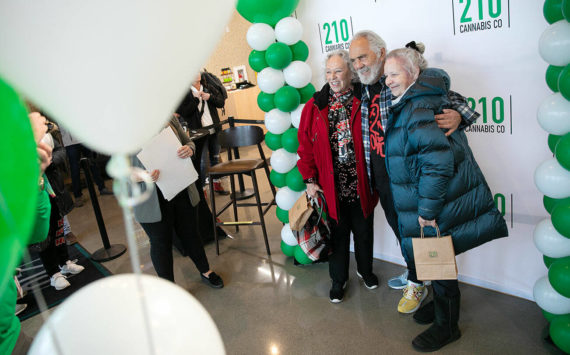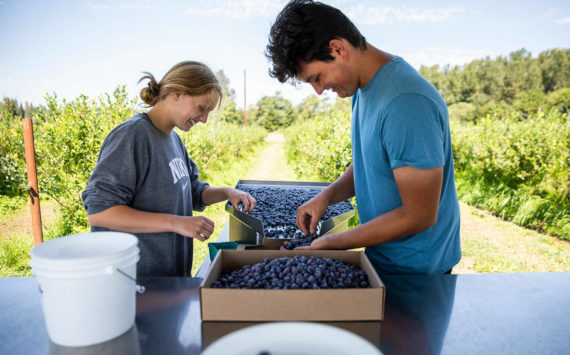SMOKEY POINT — While many holiday shoppers are already gearing up for “Black Friday,” the Arlington and Marysville communities are asking that they keep “Small Business Saturday” in mind as well on Nov. 26.
“Small Business Saturday” was started last year by American Express to help promote local stores across the country, and representatives of the cities of Arlington and Marysville agree that the small businesses in their towns add up to an economic engine which drives the region’s prosperity.
Arlington Assistant City Administrator Kristin Banfield estimated that approximately one-third of the city’s licensed businesses fall under the heading of retail-oriented small businesses.
“We probably have 300 to 350 of our 850 licensed businesses that would be considered small businesses, which employ close to 2,000 people, for an average of about five per business,” Banfield said.
While the city of Arlington classifies small businesses such as beauty salons and massage therapy under “service” rather than retail, Banfield noted that both types of small businesses generate sales tax revenues and constitute reinvestment into the local economy. She added that a number of studies have shown the importance of heeding campaigns in Arlington and Marysville to “Buy Local.”
“A study from Civic Economics found that, for every $100 spent in local independent stores, $68 returns to the community through taxes, payroll and other expenditures,” Banfield said. “If you spend that in a national chain, only $43 stays here. Spend it online through an out-of-state vendor and very little, if anything, stays home.”
Banfield went on to cite the U.S. Department of Labor’s findings in 2009 that, if half the employed population spent $50 each month in locally owned independent businesses, it would generate more than $42.6 billion in revenue.
“For every purchase you make, a portion of the 8.6 percent sales tax you pay when you buy something in Arlington stays right here,” Banfield said. “The bottom line is if you buy local, the money stays local and it keeps recirculating, providing our local community with a quality of life that can’t be beat.”
Marysville Community Information Officer Doug Buell likewise touted the value of small businesses in funding local government programs and fostering quality of life in the community.
“Of the 8.6 percent sales tax rate charged here, one tenth — 0.85 percent and 0.01 percent for criminal justice — becomes city revenue,” Buell said. “This revenue is part of the city’s general fund. That pays for the fire and police departments, senior services, parks and recreation programs, street lighting, safe sidewalks and other critical activities and services.”
Buell echoed Banfield’s data that sales taxes are only one way in which local businesses contribute to the community, by pointing to the “multiplier effect” of local business owners and employees shopping for goods and services at each other’s stores.
“When you shop locally, you can avoid higher tax rates charged in some other areas,” Buell said. “Shopping locally saves you time, gas and energy.”
In addition to contributing to services such as the city’s road and infrastructure budgets for traffic improvements and expanded infrastructure, Buell listed another benefit of small businesses to the community.
“They often hire and train young people for their first jobs, and take pride in offering personalized customer service,” Buell said.
Both the Arlington-Smokey Point and Greater Marysville Tulalip Chambers of Commerce reported on the economic returns yielded by their “Buy Local” campaigns.
“During the course of and following our 2009-10 ‘Buy Local’ campaign, we found that Marysville had fared better than surrounding communities with respect to the sales taxes returned during this time period,” Greater Marysville Tulalip Chamber Board Chair John Bell said. “Since the vast majority of our local businesses are small, the obvious conclusion is that buying locally from small businesses results in higher sales tax revenue for local government and, thus, with appropriate investment, a better quality of life in our local community.”
Mary Andersen, the office manager of the Arlington Pharmacy who’s been active in the Arlington-Smokey Point Chamber’s “Buy Local” campaign, likewise credited the partnership between the Chamber, the city of Arlington and the Downtown Arlington Business Association with further fostering interest in local small businesses.
“We’ve been able to track the interest via our Facebook page, which has 352 ‘likes,’ and our website traffic, which is always growing,” Andersen said. “We’re fortunate to live in a community with so many residents who understand why it’s important to shop locally, which is why there’s been a minimum impact on the local small business community. However, there’s always room for improvement in spreading our message.”
Mary Kirkland, owner of Hilton’s Pharmacy on Third Street in Marysville, sees small businesses as part of the “historic backbone” of the city.
“This town started as a trading post, and the small business community remains alive and well,” Kirkland said. “Entrepreneurship still drives the region.”
“When people think about shopping locally, it doesn’t really count if you’re just shopping at Walmart,” said Arlington resident Janna Mitchell, co-owner of Marysville Floral. “They should think of us too.”
“We might not have as much volume, but our uniqueness can’t be beat,” said fellow Marysville Floral co-owner Nicole Walker.
For more information on “Small Business Saturday,” log onto www.facebook.com/SmallBusinessSaturday.







